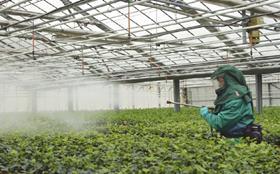
Representatives of the European crop protection industry, European farmers associations, environmental NGOs and European policymakers were among some 120 participants who gathered in Brussels for a debate on the future of agriculture in Europe.
Hosted by the European Crop Protection Association (ECPA), the event, 'Hungry for Change: Pesticides and Sustainable Agriculture', looked at how productive agriculture can achieve sustainability goals – protecting health, the environment and biodiversity – while allowing Europe’s farmers to remain competitive and help feed a growing global population.“The world faces a major challenge in the coming decades,” said Jean-Charles Bocquet, ECPA director general. “We need to feed a rapidly growing population while relying on ever-scarcer natural resources and protecting the environment.
'Europe has a responsibility to address that challenge by improving food security and ensuring the contribution of sustainable, productive agriculture to the environment and the economy,' he added. 'To do that, Europe must be a world-leader in R&D, innovation, and the sustainable production of high quality and affordable food.”
Speakers at the meeting discussed the role of pesticides in helping to achieve sustainable productive agriculture. They explored the ways Europe can better foster innovation and competitiveness, and looked at how the crop protection industry is already contributing through several projects to a sustainable and globally competitive farming future.
“European agricultural productivity is being affected by the current EU regulatory framework, with its emphasis on hazard-based legislation and often-inconsistent application of the precautionary principle,” said Jean-Philippe Azoulay, ECPA president. “This risks denying farmers the innovative solutions they need to fight the pests and diseases that threaten their crops.
“Europe must play a role in feeding the world; we cannot leave it to others to meet the challenge,” he explained. “But to achieve this, the EU needs a new policy framework that is friendlier to innovation, jobs and growth, and that takes a balanced, science-based approach to regulation.”



